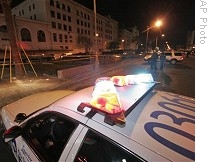-
(单词翻译:双击或拖选)
 |
| New Orleans Police investigate scene where two people were shot as a parade was ending a few blocks away on Canal Street, 18 Feb. 2007 |
According to an analysis of FBI crime data done by CQ Press, which compiles annual reports on crime for cities around the nation, New Orleans has the highest crime rate in the United States.
Last year there were 209 murders and more than 19,000 reported criminal incidents in New Orleans, putting it ahead of Camden, New Jersey1, Detroit, Michigan, and St. Louis, Missouri for the dubious2 honor of being what some headline writers refer to as "the most dangerous city."
That title is viewed with disdain3 by city officials as well as the private citizens' group The Metropolitan4 Crime Commission of Greater New Orleans, whose president, Rafael Goyeneche, spoke5 to VOA by telephone about how the people of the city view the situation.
 |
| Rafael Goyeneche, president of the Metropolitan Crime Commission (file) |
"There may be some disputes about whether we are the most-dangerous town or the second-most-dangerous or even the 100th-most dangerous," he said. "What is known to the people here is that crime is unacceptably high and they are demanding that something be done about it."
Goyeneche says New Orleans had a violent crime problem long before Hurricane Katrina struck in August, 2005 and, unfortunately, hardcore criminals were among the people who returned after the disaster. What he says is different now is the citizenry's pressure on local officials like the mayor, chief of police and district attorney to take effective action.
"There is, I think, more citizen scrutiny6 of the criminal justice system post-Katrina than there ever was pre-Katrina," Goyeneche said.
He says city officials have responded by scrapping7 some of the programs that resulted in high arrest rates for minor8 crimes, but left fewer policemen to deal with more serious crimes. Goyeneche says a different approach with drug users also shows promise.
"We just elected a new DA [district attorney] and one of the first things he wants to do is create a diversionary program where non-violent drug users' cases would be diverted out of the courts, being basically put through some counseling, given some training so they could go out and get a job and break their addiction9 problems," he said.
The president of the New Orleans Crime Commission says police need to target violent criminals and make sure they do not return to the streets to commit more crimes. He says he meets regularly with city officials to discuss the crime problem and the need to take more effective steps to reduce the threat to citizens.
 收听单词发音
收听单词发音
1
jersey

|
|
| n.运动衫 | |
参考例句: |
|
|
|
2
dubious

|
|
| adj.怀疑的,无把握的;有问题的,靠不住的 | |
参考例句: |
|
|
|
3
disdain

|
|
| n.鄙视,轻视;v.轻视,鄙视,不屑 | |
参考例句: |
|
|
|
4
metropolitan

|
|
| adj.大城市的,大都会的 | |
参考例句: |
|
|
|
5
spoke

|
|
| n.(车轮的)辐条;轮辐;破坏某人的计划;阻挠某人的行动 v.讲,谈(speak的过去式);说;演说;从某种观点来说 | |
参考例句: |
|
|
|
6
scrutiny

|
|
| n.详细检查,仔细观察 | |
参考例句: |
|
|
|
7
scrapping

|
|
| 刮,切除坯体余泥 | |
参考例句: |
|
|
|
8
minor

|
|
| adj.较小(少)的,较次要的;n.辅修学科;vi.辅修 | |
参考例句: |
|
|
|
9
addiction

|
|
| n.上瘾入迷,嗜好 | |
参考例句: |
|
|
|















